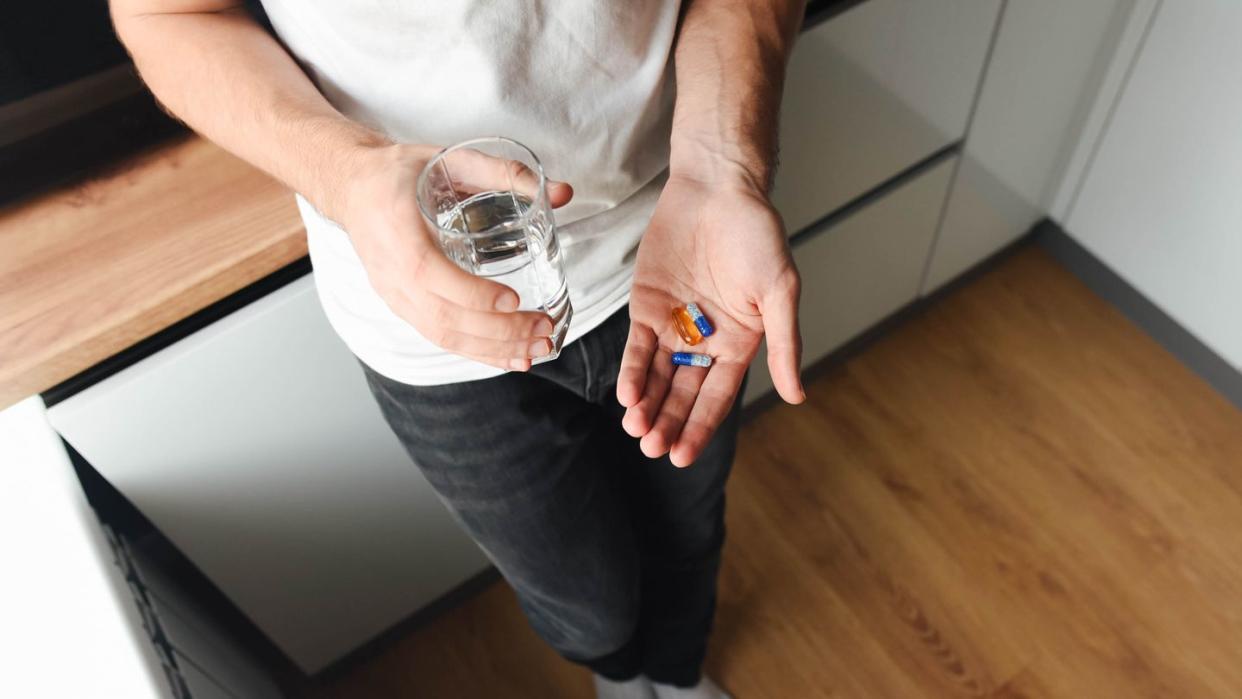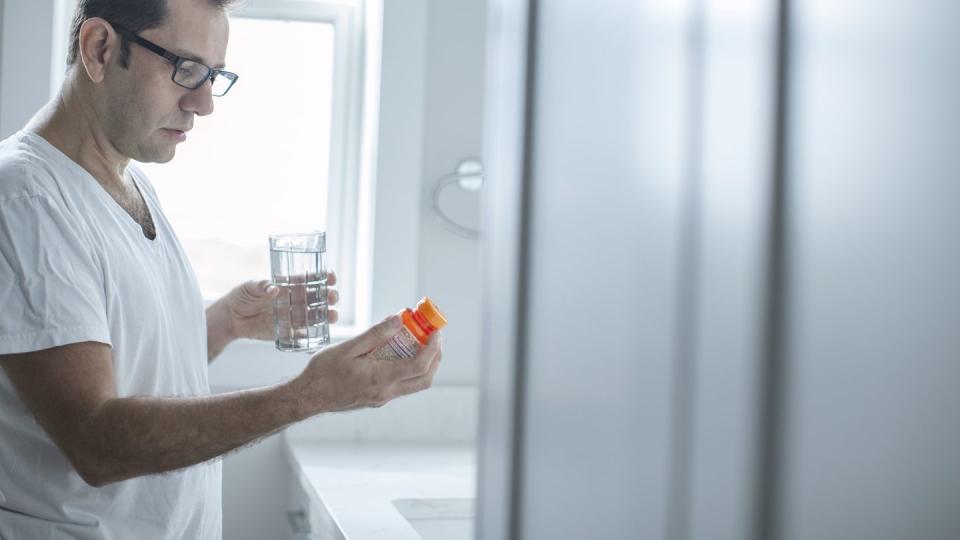Why You Shouldn’t Chew Pills That You Can’t Swallow

- Oops!Something went wrong.Please try again later.
WHEN YOU TAKE medication, you may not think much about swallowing tablets or capsules with a gulp of water. But, swallowing pills isn’t so easy for everyone.
Between 10 percent and 40 percent of adults have difficulty consuming pills, says Brigid Groves, Pharm.D., vice president of pharmacy practice at the American Pharmacists Association.
Most attribute the hesitation about swallowing pills to the physical characteristics of the pill itself, like its size, shape, texture, or taste, she explains. Others might develop an avoidance of swallowing medication after an unpleasant or traumatic experience, such as choking or gagging, which creates a psychological response.
Besides anxiety around swallowing medicine, some people have a “pathological condition” that makes it hard for them to swallow pills, says Pratima Dibba, M.D., a gastroenterologist at Medical Offices of Manhattan. These conditions include acid reflux, esophagus problems, or neurological problems.
When you struggle to swallow pills, you may be tempted to take the medicine a different way, such as crushing or chewing the pills. But, doctors and pharmacists say this usually isn’t a good idea.
“It really depends on the type of medication because when you crush or chew a pill, the pharmacology might change,” Dr. Dibba says. This might make the medication ineffective or even dangerous.
So, it’s crucial to check with your doctor or pharmacist before taking any medicine in a different way from how it’s prescribed, Groves says.
Here’s what you should know about crushing or chewing prescription or OTC medications as well as supplements, and how you can possibly train yourself to swallow pills more easily.
Should you chew or crush medications that you can’t swallow?
“Chewing or crushing pills that should be swallowed whole can be dangerous,” says Stacia Woodcock, Pharm.D., pharmacy editor at GoodRx. There are several reasons why.

For one, the medication might not work as well if it’s not taken as it should be—so you might not get the treatment you need, she explains. It might also put you at risk for increased side effects or a possible overdose.
“Many medications are designed to slowly release the active ingredients over time,” Woodcock says. “If you crush them, you’ll get all the medication at once, which can be dangerous in some cases.”
The medication could be absorbed by the body too quickly, which could be toxic, Dr. Dibba adds.
Some medications, but not all, are labeled as controlled-delivery (CD), controlled-release (CR), delayed-release (DR), enteric-coated (EC), extended-release (ER, XL, XR), long-acting (LA), or slow-release (SR). And, Woodcock says, they’re not safe to be crushed, chewed, or cut in half.
Even if you don’t see one of these labels, check with a pharmacist before crushing or chewing a drug, she emphasizes.
Capsules also generally shouldn’t be opened to release the powder or liquid inside. However, Groves says some capsule mediations are meant to be opened and their contents sprinkled onto a spoonful of yogurt or oatmeal, but the medication label will specifically say that.
Dr. Dibba says prescription opioids are one type of drug that can be dangerous if it’s crushed or chewed. Here’s a list of others that you shouldn’t crush or chew.
What about OTC medications?
Generally, adult-strength OTC medications shouldn’t be crushed or chewed, especially if it doesn’t specifically say it’s OK to crush or chew, Groves says.
“For example, crushing or chewing OTC ibuprofen is irritating to your mouth and throat, causing additional issues,” she adds. But, you might be able to take children’s ibuprofen that’s chewable or liquid—just ask your pharmacist about what an appropriate adult dose would be.
As with prescription medications, crushing or chewing OTC medications can alter their effectiveness and cause you to absorb the drug too quickly, leading to side effects or toxicity. For example, Dr. Dibba says some OTC pain relievers and cold and flu medicines may elevate liver enzymes.
Can you chew or crush supplements?
Like medications, vitamins and supplements shouldn’t be chewed or crushed, unless the package says so, Woodcock says. If you have trouble swallowing these products, look for chewable tablets, gummies, or powder versions.

Keep in mind that supplements aren’t regulated by the Food and Drug Administration, and it’s sometimes unclear what ingredients they contain, Dr. Dibba says. Some might contain ingredients that haven’t been tested and could cause side effects, especially when they're not consumed as directed.
What to Do If You Can’t Swallow Pills
If you can’t swallow a medication, ask for help.
Your doctor can sometimes prescribe the drug in a different form, like a liquid or dissolvable tablet, Dr. Dibba says. They might also prescribe a different medication that’s easier for you to take or a different dosage that comes in a smaller pill.
Talk to your pharmacist, too. Woodcock says they can let you know if it’s safe to open, cut, or crush a medication and offer tips for taking it. A pharmacist may also contact your doctor to discuss alternatives.
In some cases, a compounding pharmacy can potentially custom make easier-to-swallow dosages for you, Woodcock adds.
It’s important to note, however, that some alternative versions of medications may not be covered by your insurance, Groves says.
How to Train Yourself to Swallow Pills
It’s possible to train yourself to be able to swallow pills, but it takes practice.
“Often, it’s a case of mind over matter,” Woodcock says. “Most mouthfuls of food we swallow are much larger than an average pill.”
Some pill-taking techniques include:
Placing the pill in a spoonful of pudding or applesauce (if the medication can be taken with food).
Trying the pop-bottle method, where you place a tablet on your tongue, close your lips tightly around a water bottle, and pop your head back, as you suck in water and quickly swallow the pill. This helps flush the tablet to the back of your throat, making it easier to swallow.
Using the lean-forward technique, which involves putting a pill on your tongue, taking a sip of water, and leaning your head forward while you swallow. This move widens your throat and makes it easier to swallow.
However, if you have a medical condition that makes swallowing pills difficult, these tips might not help. Instead, talk to your doctor, who can work with you on an individual approach, Dr. Dibba says. There are also cups, straws, and sprays designed to help people swallow pills that may be recommended.
You Might Also Like

